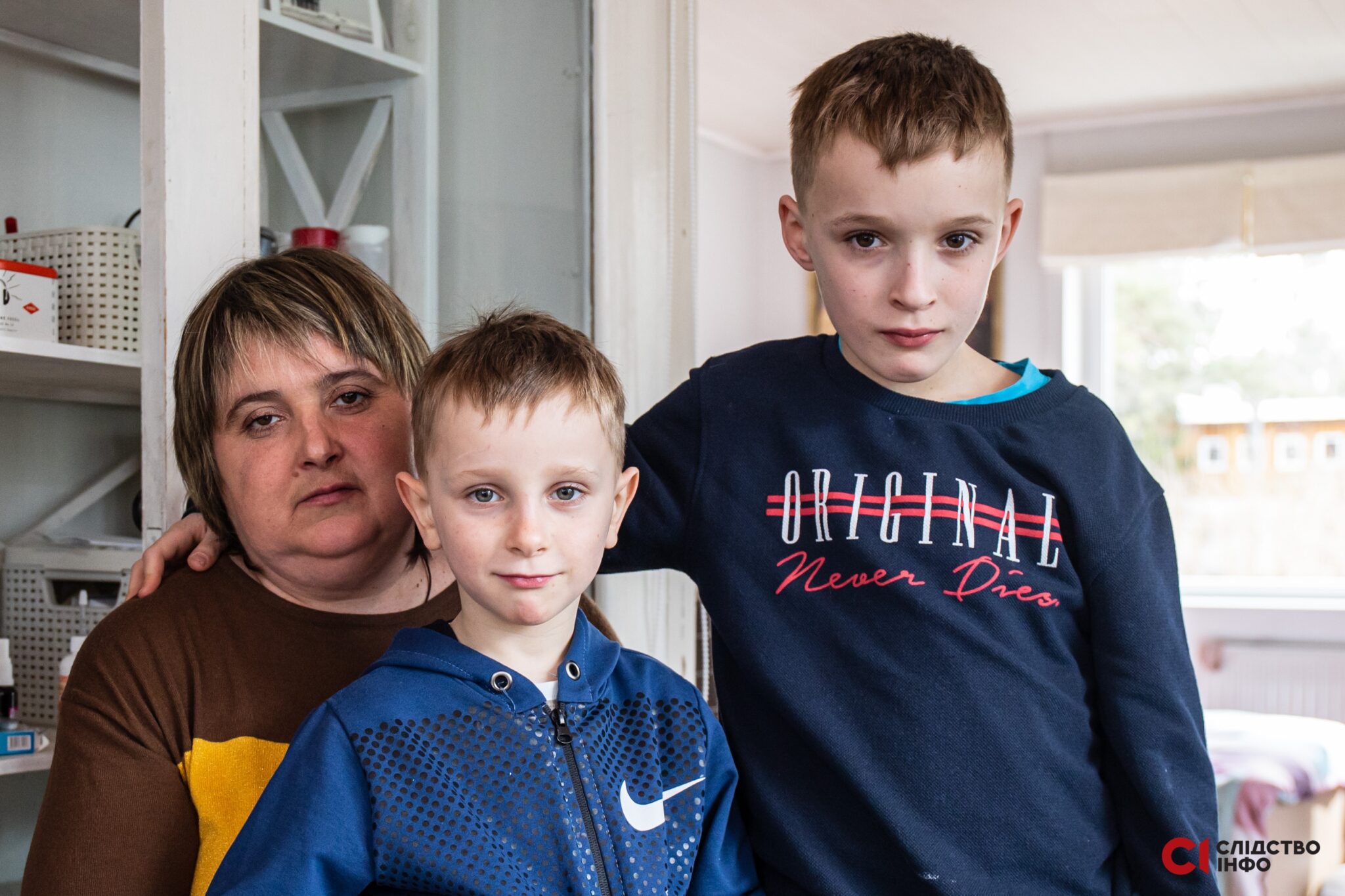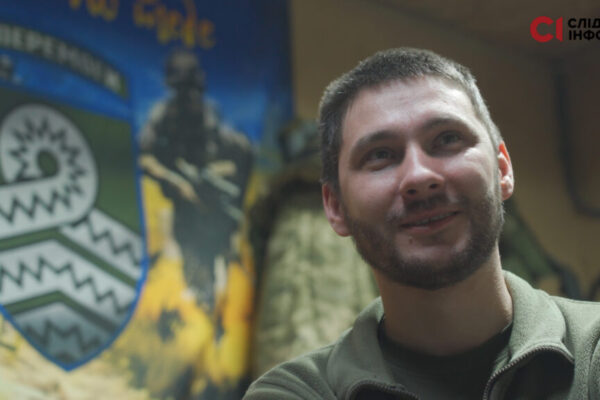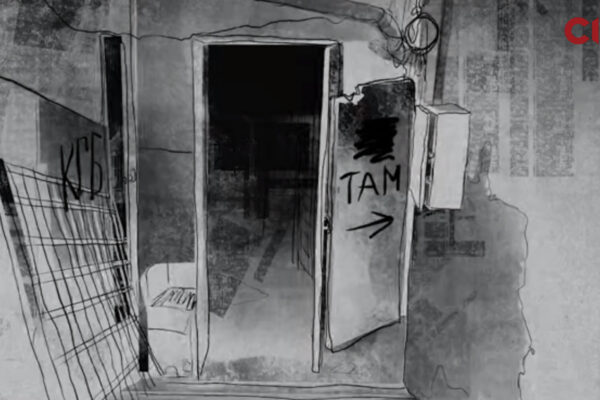Yulia and her two children were getting out of the occupied Rubizhne, which is in Luhansk oblast, for five days. Having passed the so-called filtration camps and interrogations organized by the occupiers, Yulia’s family went to Russia, and then to Estonia. The woman had to make up some relatives who seem to be waiting for her, deceive the border guards and avoid multi-level control held by the Russian authorities.
Slidstvo.Info recorded the story of a Ukrainian woman who has passed several circles of hell to escape from the war and compulsory settlement in Russia.
“THERE ARE 12 GRAVES NEAR OUR HOUSE”
Yulia, who is 40 years old, is a saleswoman from the town of Rubizhne, which is in Luhansk oblast. She has four children: two older daughters, who had moved to other city to study before the war, and two sons – 5-year-old Ivan and 11-year-old son Matthew, who were living with her in Luhansk oblast when the war began.
The town of Rubizhne, where more than 50,000 people live, is located near the demarcation line in Donbas. Back in 2014, some battles were fought there, but the city remained controlled by Ukraine. Yulia says that she had hoped that this time the war would bypass her home and the authorities would do everything to prevent people from being harmed. But Rubizhne was again on the front line. For more than a month and a half, fighting has been going on there, Russian shells are destroying houses and industrial facilities.
Yulia recalls the first days of the Russian invasion of Ukraine. She worked as a saleswoman in the store of “Nasha Ryaba” and noticed that people were buying up food.
Due to the beginning of hostilities at the end of February, poultry farms that supplied them with the products could not deliver the cargo on time. Yulia’s working day was reduced to four hours and the woman started having only morning shifts. On March 8th, the shelling of Yulia’s street has started.
“They hit two houses near. I was coming home and I saw six corpses and many wounded people on the way,” Yulia says.

The Enemy Attacked Residential Buildings In Rubizhne / Photo t.me/luhanskaVTSA
A woman with two sons and her friend with three children went to the basement. They had to cut through the wall, because the basement was bricked up.
“The night was more or less quiet, and at 6 a. m. we woke up after the hit of our house, where three entrances were damaged,” the woman recalls.
Since then, there have been more and more shootings. The Russians started shelling the Ukrainian rescuers, who were initially coming to disassemble the destroyed buildings and rescue people. They had to stop coming.
“There are about 12 graves near our house. These are elderly people whose heart gave out, people who were just wandering around and got under the shrapnel from explosions – some hit the artery, some ripped the legs off,” the woman says.
Because of the shelling, the children have not gone out at all for about two weeks. They were sitting in the basement and the food was running out.
“We learned to determine the type of shelling by its sound. We even have joked: if we heard that it flew far, we said “the message is gotten”, and if it was close – near our house or near the school – then we said “we have been reached”,” says Yulia.
Their house appeared to be on the frontline, the headquarters of the so-called Luhansk People’s Republic was located right across the street. As the military of the quasi-republic went for the water, they turned on the generator and people could also draw some water.
“The ones, who could run this kilometer and a half, drew some water and had what to drink. The ones, who couldn’t do that, had no water,” the woman said.
“ALL THE SYMBOLS OF UKRAINE WERE BURNED”
The territory controlled by Ukraine was quite close, but because of the fighting, it was impossible to get there. Yulia’s eldest daughter, Lera, who is 23 years old, advised her mother to call the volunteer hotline, but they did not even respond. Local volunteer Ruslan, who had taken people out of Rubizhne before, said that while the fighting continues, there is no access to the part of the city where she lives.
On April 2nd, Russian humanitarian aid was delivered to the town. Julia have taken it for the whole entrance – for 12 people. When two old people died, they were buried in the yard, with only 10 people left in the entrance.
“I asked for the help for 12 people, but I got it for only 8, and that was also fine. They gave us some stew, fish, two half-liter bottles a day, half a kilogram of pasta for each,” Yulia recalls.
On April 6th, there was a sweep in Rubizhne. The Kadyrovites together with the military of the Luhansk People’s Republic were robbing the apartments.
“They were sweeping the houses – removing the doors if the apartment was closed. Everything valuable was taken out of the apartment: computers, earrings. All the symbols of Ukraine were burned, the Ukrainian military uniform and flags were also burned. Everything valuable, except food, was also taken out,” the woman recalls.
Yulia approached the Russian military from the Luhansk People’s Republic with the callsign Khoma and asked how to leave the city.
“He said that it is possible to contact the school on this issue, but I thought I will not succeed in getting my children there – it was too far and the shelling took place there. He said he would come up with something,” the woman recalled.
The next night, Khoma came to Yulia’s house and gave her four minutes to get ready.
“You do understand what a person can pack in 4 minutes. My children’s belongings were already packed in a bag, the documents hung on me all these 30 days and have already grown to the body,” says Yulia.

Screenshot from the Evacuation of Ukrainians Video, published by the Luhansk People’s Republic
Together with children and a neighboring family, they left with the residents of the Luhansk People’s Republic to Starobilsk, a city 50 kilometers from Rubizhne that was controlled by Russians.
“THE RUSSIANS HAVE INTERROGATED THE MEN FOR 10–20 HOURS”
In the morning, the family was taken to Milove, a village that until recently was controlled by Ukraine, but with the beginning of a full-scale invasion, it was captured by the Russians. There is a checkpoint between Ukraine and Russia.
“We were taken to the station by bus and then had to walk to the Russian border. There was a queue of about 1.5 thousand people, and cars were in line with a length of 6–7 kilometers. Elderly people, children and disabled people were allowed to pass quickly,” Yulia says.
The woman recalls that her friend and her husband were kept at the border for almost a day. He was questioned – after that there was almost no contact with them.
“Her husband is 36 years old and has been questioned for about 20 hours. That’s why we lost each other at the border. I left 15 hours earlier by bus, and she with her children waited for him to be released from the interrogation. The men were kept at Russian customs for 10-20 hours,” Yulia says.
It seems that these are the so-called filtration camps, where Russians interrogate Ukrainians and decide who to release, who to keep, who to send to the so-called «army» of the Luhansk People’s Republic, and who to shoot.
One more interrogation by the Russians was waiting for the Ukrainian woman and her children ahead.
“THERE WERE 650 MARIUPOL RESIDENTS AND 47 RESIDENTS OF RUBIZHNE IN THE TRAIN”
On the Russian territory, a woman and children were put in a bus. They were waiting for departure for another 15 hours.
“Then we were taken to the Rostov oblast, Likhaya station. We were placed in the local House of Creativity, where we were kept for 3–4 hours. They photographed us and our documents, the children were asked if I was really their mother,” Yulia says.
They spent the night in the camp. In the morning they were told that they would be taken towards St. Petersburg. Back in Rubizhne, a woman hid her mobile phone and was able to take it to Russia.
“I got in touch with my daughter and said that we were in Russia. She told me there was an opportunity to get home, but I shouldn’t sign anything. And she told me to somehow “get lost”. I couldn’t go to the place where they were taken. But it was necessary to get closer to St. Petersburg not to wander around Russia,” the woman says.
The train to St. Petersburg traveled 36 hours – a day longer than planned. Julia approached the head of the train and found out when the final stop would be.
“The head of the train asked why I needed that information. I lied that there were some relatives in St. Petersburg and that they contacted me via the Internet,” Yulia recalls.
She and her sons got off the train first. Immediately at the station the police chief stopped them.
“They asked which relatives I was going to, where they came from, asked the address of relatives. I told him an address that didn’t exist,” the woman said.
A man, with whom the eldest daughter had agreed on saving her mother, was waiting for Julia and her children on the platform. He confirmed that the woman has relatives in St. Petersburg, and due to the large number of people and chaos on the platform, she was released.
“There were 650 Mariupol residents and 47 Rubizhne residents in the train. And they had to take photos and record every person. They simply did not have time to interrogate me,” Yulia says.
The police chief gave the woman a phone with a Russian SIM-card so that she could be contacted. When she arrived at the local people who were hiding her, she received several calls from the police.
“They called me three times at night and asked for the exact address of my location. They said that they wanted to provide me with some aid and should know my address,” Yulia says.
“YOU COULD SAY SOMETHING AND THEN BE KILLED FOR THAT“
The next day, a daughter’s acquaintance took the woman to the border with Estonia. There was the last checkpoint that Yulia had to pass. Her documents were again photographed and their stuff was carefully checked.
“At customs, the Russians checked my belongings for a very long time – twice. I don’t know what they were looking for. Then they took my documents away, about an hour and a half these documents were not taken out. They asked why I was leaving the Russian Federation, why I was going to Estonia and to whom. The same when I crossed the border. They called my eldest son and asked him his date of birth. Then Vanya, a five-year-old boy, was interrogated,” says Yulia, who was on her way to a safe place for the fifth day.
After a thorough inspection, she was allowed to leave Russia.

Yulia’s Family is Safe in Estonia / Photo Jaanus Lensment from Ekspress Meedia
The most terrible things among everything that happened to Yulia during these 5 days, which she and her sons spent moving through the occupied and Russian territories, are called “filtration” conversations.
“The hardest part was looking into their eyes and having no ability to say anything because you know you could say something and then be killed for that. Or been kept in the “hoosegow” for 10–15 years for only one word,” says Yulia.
The woman is now safe. At the end of the conversation, Julia begins to worry: “I still can’t calm down… What was I rescued from? From my home? From work? From my house, that I earned with my hands? People from life? What were we rescued from? I can’t understand.”



